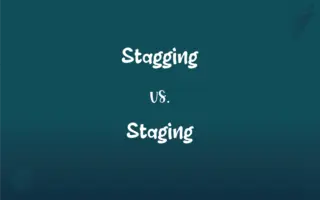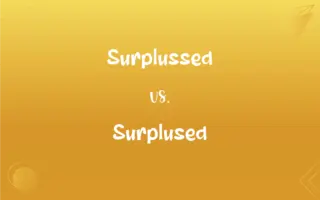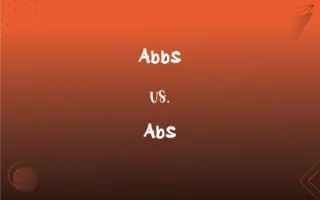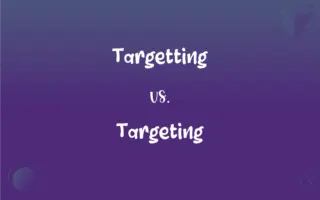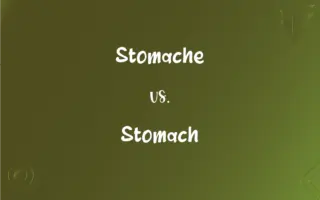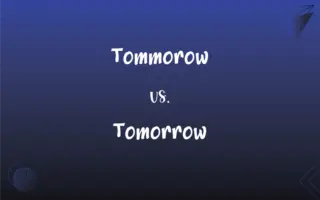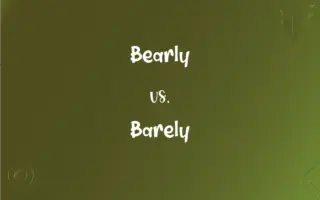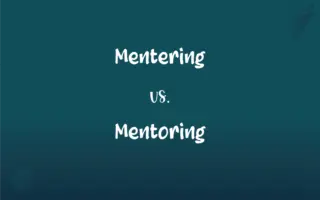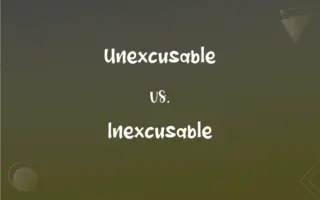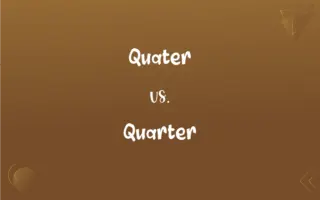Relevent vs. Relevant: Mastering the Correct Spelling
Edited by Aimie Carlson || By Janet White || Updated on March 14, 2024
Relevent is an incorrect spelling of Relevant. Relevant pertains to being appropriate or connected with the matter at hand.
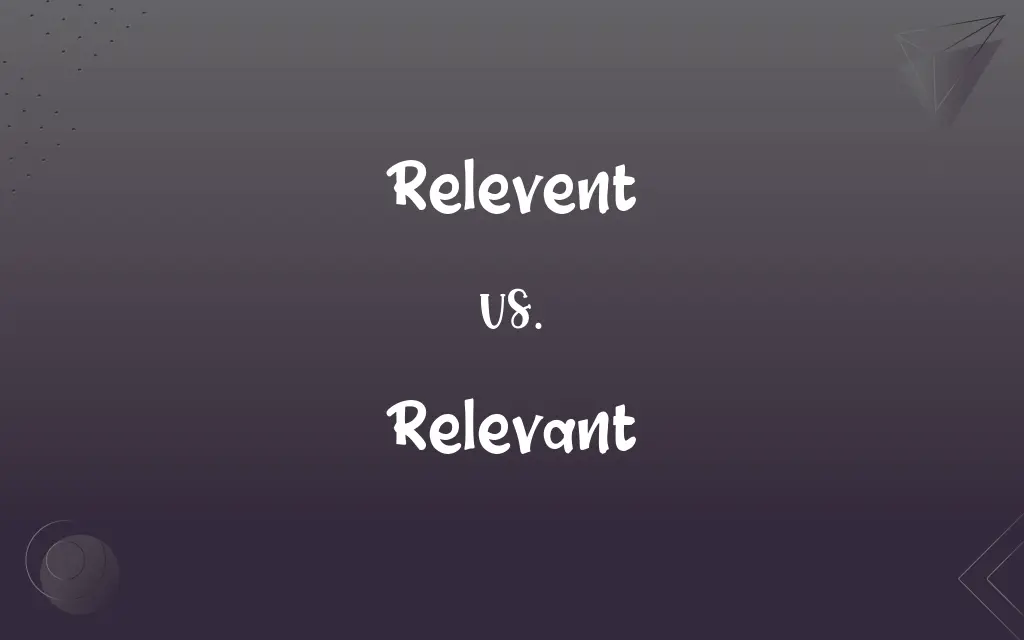
Which is correct: Relevent or Relevant
How to spell Relevant?

Relevent is Incorrect

Relevant is Correct
ADVERTISEMENT
Key Differences
Relevant rhymes with "elephant."
Remember: "a" after "v" in "relevant."
Think of "elephant" and remember the middle part "ele" in "relevant."
There's no "e" after "v" in "relevant."
The word "relate" can remind you of "relevant" because both talk about connection.
ADVERTISEMENT
Correct usage of Relevant
Finding relevent articles took longer than expected.
Finding relevant articles took longer than expected.
The information was not found to be relevent to our case.
The information was not found to be relevant to our case.
His experience is highly relevent to the job he's applying for.
His experience is highly relevant to the job he's applying for.
She made a relevent point during the discussion.
She made a relevant point during the discussion.
The data was considered relevent by the research team.
The data was considered relevant by the research team.
Relevant Definitions
Relevant can describe something that is pertinent or appropriate.
The data provided was relevant to our research.
Relevant suggests having bearing on or connection with the subject.
Only relevant evidence is admissible in court.
Relevant means directly related to the matter at hand.
Her points were relevant to the discussion.
Relevant can refer to being significant or important in a particular context.
His expertise became especially relevant during the crisis.
Relevant can imply being currently important or in vogue.
She only reads articles that are relevant to today's youth.
Having a bearing on or connection with the matter at hand.
Meaningful or purposeful in current society or culture
Thought that the traditional male role of breadwinner was no longer relevant.
Related, connected, or pertinent to a topic.
(Usually and especially) Directly related, connected, or pertinent, with important ramifications or implications.
His mother provided some relevant background information concerning his medical condition.
Not out of date; current.
Relieving; lending aid or support.
Bearing upon, or properly applying to, the case in hand; pertinent; applicable.
Close and relevant arguments have very little hold on the passions.
Sufficient to support the cause.
Having a bearing on or connection with the subject at issue;
The scientist corresponds with colleagues in order to learn about matters relevant to her own research
Having crucial relevance;
Crucial to the case
Relevant testimony
Relevant Sentences
It's important to ask questions that are relevant to the topic.
He struggled to see how the mathematics concept was relevant to his life.
Finding relevant case studies can help support your argument.
The teacher explained how the history lesson is relevant to current events.
The course material was updated to remain relevant to current practices.
The conference focuses on topics relevant to emerging technologies.
She looks for books that are relevant to her interests.
The lawyer presented evidence that was relevant to the case.
She included only the most relevant information in her report.
They discussed trends relevant to the digital marketing industry.
The museum exhibition included artifacts relevant to the region's history.
Students were encouraged to pursue projects relevant to their future careers.
Articles relevant to the subject were compiled for further reading.
He made sure his contributions to the meeting were relevant.
The workshop covered skills relevant to the workplace.
The research paper included data relevant to the hypothesis.
The article highlighted technologies relevant to renewable energy sources.
The survey asked questions relevant to consumer behavior.
They debated issues relevant to the upcoming election.
Feedback provided was relevant to improving the product's design.
Relevant Idioms & Phrases
Relevant experience
Work or life experience that directly relates to a job or task.
Employers often seek candidates with relevant experience.
Stay relevant
To remain closely connected or appropriate to the matter at hand.
In a rapidly changing industry, it's crucial to stay relevant.
Relevant to your interests
Pertaining or relating to one's personal interests or concerns.
The magazine covers topics relevant to your interests.
Socially relevant
Pertaining to issues that are significant to society or public welfare.
The film was praised for its socially relevant themes.
Topically relevant
Directly relating to the subject being discussed or considered.
The journalist focused on stories that were topically relevant.
Make it relevant
To ensure information or actions are applicable to the current situation or topic.
Teachers strive to make lessons relevant to students' lives.
Technologically relevant
Being up-to-date with the latest technological developments.
Staying technologically relevant is essential for businesses today.
Environmentally relevant
Relating to or affecting the environment.
The conference discussed environmentally relevant policies.
Relevant authority
An expert or authoritative source that is pertinent to a particular field or topic.
The study cites several relevant authorities on climate change.
Culturally relevant
Reflecting or respecting the cultural aspects and values of a particular group.
The curriculum includes culturally relevant materials.
Relevant question
A query that directly pertains to the subject matter.
During the Q&A, she asked a highly relevant question.
Historically relevant
Having importance or significance in history.
The site is historically relevant for its role in the civil rights movement.
FAQs
Why is it called Relevant?
It originates from the Latin word "relevans," meaning "raising up or alleviating."
Which vowel is used before Relevant?
"A" as in "a relevant point."
Which preposition is used with Relevant?
"To" as in "relevant to the discussion."
What is the root word of Relevant?
The root comes from the Latin "relevare" meaning "to raise or lighten."
What is the singular form of Relevant?
Relevant.
What is the verb form of Relevant?
Relevant is an adjective. The related verb might be "relate" or "pertain."
What is the pronunciation of Relevant?
"REL-uh-vənt."
What is the plural form of Relevant?
Relevant is an adjective and does not have a plural form.
Which conjunction is used with Relevant?
Any conjunction can be used, depending on the context.
Is Relevant a negative or positive word?
Neutral, but it can take on positive or negative connotations based on context.
Is Relevant an adverb?
No.
What is a stressed syllable in Relevant?
The first syllable, "Rel."
What part of speech is Relevant?
Adjective.
What is another term for Relevant?
Pertinent.
Which determiner is used with Relevant?
Determiners like "this," "that," "his," "her" can be used depending on context.
Which article is used with Relevant?
Both "a" and "the" can be used, depending on context.
Is Relevant an abstract noun?
No, it's an adjective.
Is Relevant a collective noun?
No.
What is the opposite of Relevant?
Irrelevant.
What is the third form of Relevant?
Not applicable.
Is Relevant a vowel or consonant?
Relevant is a word containing both vowels and consonants.
Is Relevant a countable noun?
No, it's an adjective.
Is the Relevant term a metaphor?
No, but it can be used in metaphoric contexts.
Is Relevant a noun or adjective?
Relevant is an adjective.
Is the word Relevant imperative?
No.
What is the first form of Relevant?
Not applicable as Relevant is an adjective.
How many syllables are in Relevant?
Three.
How do we divide Relevant into syllables?
Rel-e-vant.
What is the second form of Relevant?
Not applicable.
How is Relevant used in a sentence?
"The information she provided was highly relevant to our investigation."
About Author
Written by
Janet WhiteJanet White has been an esteemed writer and blogger for Difference Wiki. Holding a Master's degree in Science and Medical Journalism from the prestigious Boston University, she has consistently demonstrated her expertise and passion for her field. When she's not immersed in her work, Janet relishes her time exercising, delving into a good book, and cherishing moments with friends and family.
Edited by
Aimie CarlsonAimie Carlson, holding a master's degree in English literature, is a fervent English language enthusiast. She lends her writing talents to Difference Wiki, a prominent website that specializes in comparisons, offering readers insightful analyses that both captivate and inform.


